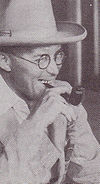- German Namibians
-
German Namibians Notable German Namibians:
Adolph Jentsch
Monica Dahl • Klaus Dierks • Erik Hoffmann • Jörg Lindemeier • Anton Lubowski • Oliver Risser • Friedhelm SackTotal population ~30,000 (2% of Namibia's population) Regions with significant populations Central and South Namibia Languages Religion Christian, Protestant, Roman Catholic, Lutheran
German Namibians (German: Deutschnamibier) are a community of people descended from ethnic German colonists who settled in present-day Namibia. In 1883, the German trader Adolf Lüderitz bought (from a local chief) what would become the southern coast of Namibia and founded the city of Lüderitz. The German government, eager to gain overseas possessions, annexed the territory soon after, naming it South-West Africa (German: Deutsch-Südwestafrika). Small numbers of Germans subsequently immigrated there, many coming as soldiers (German: Schutztruppe), traders, diamond miners, or colonial officials. In 1915, during the course of World War I, Germany lost Southwest Africa (see History of Namibia); after the war, the former colony became a South African mandate. The German settlers were allowed to remain and, until independence in 1990, German remained an official language of the territory.
Contents
Language
Today, English is the country's sole official language, but about 30,000 Namibians of German descent (around 2% of the country's overall population) and possibly 15,000 black Namibians (many of whom returned from East Germany after Namibian independence) still speak German or Namibian Black German, respectively[1]. However, the numbers of German Namibians, rather than of Namibian speakers of German, are uncertain, for many Namibians of German descent either no longer speak German or prefer classification as Afrikaners.
Communities
Most German-speakers live in the capital, Windhoek (German: Windhuk), and in smaller towns such as Swakopmund and Lüderitz, where German architecture, too, is highly visible. Many German Namibians are prominent in business, farming, and tourism or as governmental officials. For example, the first post-independence mayor of Windhoek was a German Namibian. The interests of the community are usually voiced through Africa's only German-speaking daily, Die Allgemeine Zeitung. The legacy of German colonialization in Namibia can also be seen in the Lutheran Church, which is the largest religious denomination in the country.
Many place names in Namibia carry names of German origin. The main road in the capital city, Windhoek, before independence had retained the name Kaiserstrasse ("Emperor Street").
Decline
The percentage of the population of Namibia formed by Germans has declined recently, spurring speculation that the overall number of German Namibians is decreasing. But the decline in the percentage of German Namibians is mainly due to their low birth rates (still above replacement rate) and the fact that other Namibian ethnic groups have higher birth rates and bigger families. Unlike other southern African white groups, emigration to Europe, Australia or North America is not common. German Namibians tend to emigrate instead to South Africa.
According to the 2001 Census, only 1.1% of all Namibian households use German as a home language (3,654 households), which is much less than that for Afrikaans (39,481 or 11.4%) or English (6,522 or 1.9%).[2]
See also
- Ethnic Germans
- Germans
- History of Namibia
- German South-West Africa
- Namibia Breweries Limited A German style brewery in Namibia
- Scouts of Namibia
- Afrikaaners
References
External links
German people Historical 
Diaspora EuropeTransylvanian Saxons / Landler · Danube / Banat / Satu Mare Swabians · Dobruja · Zipser · Regat · Bessarabia · BukovinaElsewhereCzech Republic (Sudetenland) · Hungary · Bessarabia · Poland · Russia (Volga · Russian Mennonite) · Slovakia · Slovenia (Gottschee County) · Ukraine (Black Sea · Bukovina · Crimea)Balkans and SoutheasternElsewhereArgentina · Bolivia · Brazil · Canada (Hutterites) · Chile · Cuba · Jamaica · Mexico · Paraguay · Peru · United States (Pennsylvania Dutch · Texas · Palatines · Puerto Rico)AfricaNamibia · South Africa (Afrikaners)AsiaOceaniaSee also Categories:- Namibian people of German descent
- German diaspora
- Ethnic groups in Namibia
Wikimedia Foundation. 2010.

